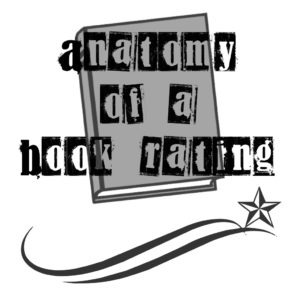 You’ve heard of Goodreads, right? Have you joined yet? If not, you should! In the unlikelihood that you are not familiar with Goodreads, here’s the scoop: Goodreads is a social media site that allows you to keep track of books that you have read, are currently reading, or want to read in the future. You can also see what books your friends are reading and receive personalized recommendations based on the types of books you enjoy. The absolute BEST feature of Goodreads is the rating system, which allows you to rate the books you have read as well as see how other readers have rated books you are interested in. The only problem with this feature is that everyone goes about rating books a bit differently. For one person, 3 stars may mean, “yes, I liked it, I’d recommend it,” whereas another person might give 3 stars to a book that they simply tolerated but didn’t necessarily enjoy. Nerd that I am, I have actually put quite a bit of thought into the way I rate books on Goodreads, and since I plan to use the same rating system for the books I review on this site, I decided to put together a guide explaining how my ratings should be interpreted.
You’ve heard of Goodreads, right? Have you joined yet? If not, you should! In the unlikelihood that you are not familiar with Goodreads, here’s the scoop: Goodreads is a social media site that allows you to keep track of books that you have read, are currently reading, or want to read in the future. You can also see what books your friends are reading and receive personalized recommendations based on the types of books you enjoy. The absolute BEST feature of Goodreads is the rating system, which allows you to rate the books you have read as well as see how other readers have rated books you are interested in. The only problem with this feature is that everyone goes about rating books a bit differently. For one person, 3 stars may mean, “yes, I liked it, I’d recommend it,” whereas another person might give 3 stars to a book that they simply tolerated but didn’t necessarily enjoy. Nerd that I am, I have actually put quite a bit of thought into the way I rate books on Goodreads, and since I plan to use the same rating system for the books I review on this site, I decided to put together a guide explaining how my ratings should be interpreted.- 1 star: I hated this book and would recommend it to no one. I hardly (if ever) give a book a 1-star rating, because I am particular about the books I choose to read and steer clear from books I know won’t interest me. If I’ve started a book and reading proves too painful, I simply won’t continue reading it. (This is a perk of being an adult and getting to choose my own reading material.)
–> Example of a 1-star book: Moby Dick, by Herman Melville
- 2 stars: I really did not care for this book. For a book to receive a 2-star rating, it must have had some redemptive quality that kept me reading, but in the end, it did not prove satisfactory.
–> Example of a 2-star book: The Maze Runner, by James Dashner
- 3 stars: This was a decent book, but didn’t really stand out in any way. Many series books fall into this category for me. I read them because they are familiar and comfortable, not because they are great literature.
–> Example of a 3-star book: The Notebook, by Nicholas Spark
- 4 stars: I really enjoyed and appreciated this book, but something was missing. Either the writing wasn’t what it could be, or the plot seemed lacking in some way. These are books that I consider very good, just not great.
–> Example of a 4-star book: Eat, Pray, Love, by Elizabeth Gilbert
- 5 stars: I loved this book and will recommend it to everyone I know. It is rare for me to give a book 5 stars. I like to save this rating for truly amazing books.
–> Example of a 5-star book: And Then There Were None, by Agatha Christe
{{A note on half stars: Quite frequently a book fails to land directly in one of these categories, so I will give it a half star. This is not an exact science, and even with half-stars, there is great variation within each rating. Also, my opinion of a book is highly dependent on the circumstances in which I have read it. I learned this in a very tangible way last year when I revisited The Great Gatsby: in my first experience with this book (as required reading in high school) I HATED it (1 star rating), but ten years later, I found it to be pretty amazing (4.5 stars). I think – hope – that this is a simple reality of subjective scoring, and that I’m not just fickle!}}
I’d love to know: do you enjoy giving ratings to the books you read? What criteria do you use when rating a book? And, the ultimate question: are we friends yet on Goodreads?